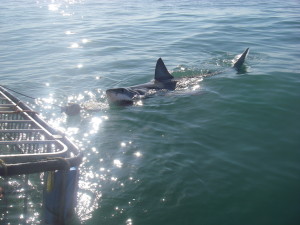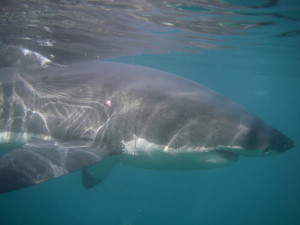Marine Life & Conservation
Decimation of the Great White Shark

The Great White Shark has survived an array of disasters during the last few million years, including several ice ages, which saw the extinction of many animals. Yet it is unlikely to survive its biggest threat to date… us. Some shark specialists believe they could be wiped out within the next decade. With the alarming decline in their numbers, this might be the last chance for people to see these incredible creatures without having to visit a museum.
Since the Great White Shark was listed on CITES Appendix II* at the 13th meeting of the Conference of Parties of CITES in Bankok, 2004, we have still seen massive drop in their numbers. Through research conducted by White Shark Africa’s students aboard vessels, we have seen the average number of individual Great White Shark sightings per boat trip drop from 4.56, to 2.75** and another recent study has discovered that only 219 Great White Sharks now exist in the waters off California***.
The World Wildlife Fund (WWF) seem to have made an accurate prediction in September 2004 when they listed the Great White Shark among the ten species of animals and trees it believes will most likely become extinct. Shark finning, trophy hunting, the fishing trade, beach protection nets and ocean pollution all play a part in the decimation of these top level predators. Females do not reach reproductive age until at least 15 years of age, have a low reproductive rate with very small litters, and therefore cannot reproduce at the same rate as their decline.
Despite their ferocious portrayal, the Great White Shark is a sociable character, often gentle and inquisitive, and even playful at times. They contribute massively to our ecosystems and with their deteriorating numbers we will see a direct impact to the entire planet. These top predators keep the marine ecosystems in balance with the prey they eat and if it is not held in check, the food source for several species of marine life disappears including microorganisms, which are essential for sustaining life.
Christo Kruger, Director of White Shark Africa has worked with Great White Sharks for over 12 years though his passion stems back even longer and he is extremely concerned for their survival. “I’ve seen a dramatic drop in the number of sharks along the Western Cape coastline during my time working with them,” says Christo. “If things don’t change now, we will be responsible for the destruction of a species, though it may already be too late to change their future. I believe that we will be looking at the world’s oceans in 10 years time and it will almost be devoid of life.”
Several ways to get involved
- Join one of White Shark Africa’s programs and learn more about these incredible creatures while viewing them in their natural environment.
- Book a place on a viewing and cage diving trip, helping to ensure that the Great White Shark is worth more alive than dead.
- Write to IUCN (International Union for Conservation of Nature and Natural Resources) to enforce the need for Great Whites to be relisted on their red list as ‘critically endangered’. They are currently classified as ‘vulnerable’.
- Write to CITES to ask them to propose to move Great White Sharks to Appendix I*.
[youtube id=”GwN9ovmDg9g” width=”100%” height=”400px”]
To find out more, visit http://www.whitesharkafrica.com
- * CITES (Convention on International Trade in Endangered Species of Wild Fauna and Flora) Appendix II includes species not necessarily threatened with extinction, but in which trade must be controlled in order to avoid utilisation incompatible with their survival. Appendix I lists species that are the most endangered.
- ** Research comparison of data from January to June 2010 with January to June 2011 and average number of individual sightings calculated per trip.
- *** Study conducted by Royal Society Biology Letters on Great White Sharks off Central California between 2006 and 2008.
Marine Life & Conservation
Double Bubble for Basking Sharks

 The Shark Trust is excited to announce that, for two more days only, all donations, large or small, will be doubled in the Big Give Green Match Fund!
The Shark Trust is excited to announce that, for two more days only, all donations, large or small, will be doubled in the Big Give Green Match Fund!
Donate to Basking in Nature: Sighting Giants
The Shark Trust is hoping to raise £10k which will be doubled to £20k. This will go towards Basking in Nature: Sighting Giants. And they need YOUR help to reach they’re goal.
The Shark Trust’s citizen science project is to monitor and assess basking sharks through sightings; encouraging data collection, community engagement, and promoting nature accessibility. This initiative aims to enhance health and wellbeing by fostering a deeper connection with British Sharks.
Campaign Aims
- Increase citizen science reporting of Basking Sharks and other shark sightings to help inform shark and ray conservation.
- Provide educational talks about the diverse range of sharks and rays in British waters and accessible identification guides!
- Create engaging and fun information panels on how to ID the amazing sharks and rays we have on our doorstep! These can be used on coastal paths around the Southwest. With activities and information on how you can make a difference for sharks and rays!
- Promote mental wellbeing through increasing time in nature and discovering the wonders beneath the waves!
Donate, and double your impact. Click Here
Marine Life & Conservation
Leading UK-based shark conservation charity, the Shark Trust, is delighted to announce tour operator Diverse Travel as a Corporate Patron

 Corporate Patrons provide a valuable boost to the work of The Shark Trust. The Trust team works globally to safeguard the future of sharks, and their close cousins, the skates and rays, engaging with a global network of scientists, policymakers, conservation professionals, businesses and supporters to further shark conservation.
Corporate Patrons provide a valuable boost to the work of The Shark Trust. The Trust team works globally to safeguard the future of sharks, and their close cousins, the skates and rays, engaging with a global network of scientists, policymakers, conservation professionals, businesses and supporters to further shark conservation.
Specialist tour operator Diverse Travel has operated since 2014 and is committed to offering its guests high quality, sustainable scuba diving holidays worldwide. Working together with the Shark Trust will enable both organisations to widen engagement and encourage divers and snorkellers to actively get involved in shark conservation.
“Sharks are truly at the heart of every diver and at Diverse Travel, we absolutely share that passion. There is nothing like seeing a shark in the wild – it’s a moment that stays with you forever!” says Holly Bredin, Sales & Marketing Manager, Diverse Travel.
“We’re delighted to celebrate our 10th year of business by becoming a Corporate Patron of the Shark Trust. This is an exciting partnership for Diverse and our guests. We will be donating on behalf of every person who books a holiday with us to contribute towards their vital shark conservation initiatives around the world. We will also be working together with the Trust to inspire divers, snorkellers and other travellers to take an active role – at home and abroad – in citizen science projects and other activities.”
Paul Cox, CEO of The Shark Trust, said:
“It’s an exciting partnership and we’re thrilled to be working with Diverse Travel to enable more divers and travellers to get involved with sharks and shark conservation. Sharks face considerable conservation challenges but, through collaboration and collective action, we can secure a brighter future for sharks and their ocean home. This new partnership takes us one more valuable step towards that goal.”
For more information about the Shark Trust visit their website here.
For more about Diverse Travel click here.
-

 News3 months ago
News3 months agoHone your underwater photography skills with Alphamarine Photography at Red Sea Diving Safari in March
-

 News3 months ago
News3 months agoCapturing Critters in Lembeh Underwater Photography Workshop 2024: Event Roundup
-

 Marine Life & Conservation Blogs3 months ago
Marine Life & Conservation Blogs3 months agoCreature Feature: Swell Sharks
-

 Blogs2 months ago
Blogs2 months agoMurex Resorts: Passport to Paradise!
-

 Blogs2 months ago
Blogs2 months agoDiver Discovering Whale Skeletons Beneath Ice Judged World’s Best Underwater Photograph
-

 Marine Life & Conservation2 months ago
Marine Life & Conservation2 months agoSave the Manatee Club launches brand new webcams at Silver Springs State Park, Florida
-

 Gear Reviews3 months ago
Gear Reviews3 months agoGear Review: Oceanic+ Dive Housing for iPhone
-

 Gear Reviews2 weeks ago
Gear Reviews2 weeks agoGEAR REVIEW – Revolutionising Diving Comfort: The Sharkskin T2 Chillproof Suit









